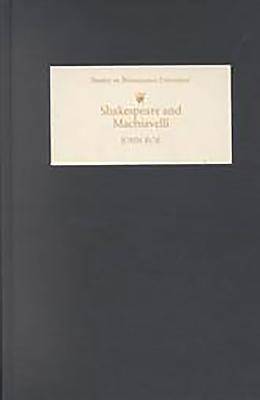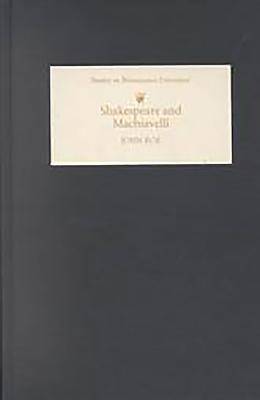
Bedankt voor het vertrouwen het afgelopen jaar! Om jou te bedanken bieden we GRATIS verzending (in België) aan op alles gedurende de hele maand januari.
- Afhalen na 1 uur in een winkel met voorraad
- In januari gratis thuislevering in België
- Ruim aanbod met 7 miljoen producten
Bedankt voor het vertrouwen het afgelopen jaar! Om jou te bedanken bieden we GRATIS verzending (in België) aan op alles gedurende de hele maand januari.
- Afhalen na 1 uur in een winkel met voorraad
- In januari gratis thuislevering in België
- Ruim aanbod met 7 miljoen producten
Zoeken
€ 177,45
+ 354 punten
Omschrijving
Although the question of Machiavellian influence on Shakespeare has been thoroughly debated, this book represents the first attempt to compare the two authors in detail. The playwright and the political philosopher share a common ground, a fascination with the motives and morality of political action, which makes for remarkable similarities in their presentation of the subject. In his deploying of the argument, the author of Il Principe emerges as a dramatic writer, like his English counterpart. The book, while taking in an obvious 'Machiavel' figure such as Richard III, considers Machiavelli in relation to Shakespeare's depiction of more conventionally noble princes such as Henry V, together with other monarchs from the Henriad - Richard II and Henry IV - as well as King John. Though the Shakespearean focus falls on the histories, tragic heroes such as Hamlet and Macbeth also receive attention. The study concludes with two chapters on the Roman plays and assesses Shakespeare's representation of the problem of conscience (Julius Caesar) and magnanimity (Antony and Cleopatra) in the light of Machiavelli's republicanism. JOHN ROE is Senior Lecturer at the University of York.
Specificaties
Betrokkenen
- Auteur(s):
- Uitgeverij:
Inhoud
- Aantal bladzijden:
- 232
- Taal:
- Engels
- Reeks:
- Reeksnummer:
- nr. 9
Eigenschappen
- Productcode (EAN):
- 9780859917643
- Verschijningsdatum:
- 1/03/2002
- Uitvoering:
- Hardcover
- Formaat:
- Genaaid
- Afmetingen:
- 173 mm x 231 mm
- Gewicht:
- 489 g

Alleen bij Standaard Boekhandel
+ 354 punten op je klantenkaart van Standaard Boekhandel
Beoordelingen
We publiceren alleen reviews die voldoen aan de voorwaarden voor reviews. Bekijk onze voorwaarden voor reviews.









